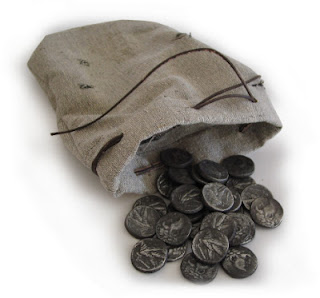It says in scripture, that Judas Iscariot, one of the Twelve, went to chief priests and offered to turn Jesus in to them. In Matthew’s account, Judas asks them “what are you willing to give me if I hand him over to you?” (Matt 26:15). They agree to give him 30 pieces of silver, and from that moment on it says that Judas was looking for an opportunity to hand Jesus over to them. (Matt 26: 14-16; Mk 14: 10-11; Lk 22: 1-6)
Even though this is short passage, there is a lot to be gleaned. You will remember that it has been made clear on many different occasions that the chief priests and scribes were looking for an opportunity to arrest Jesus and put him to death. In many cases, the only thing that stopped them was their fear of the crowds for they regarded Jesus "as a prophet" (Mt 21:46). The disciples, including Judas, must have been aware of their schemes. Judas, however, did not hate Jesus. He had followed him for three years and became one of Jesus' closest friends.On the contrary, it goes on to say in Matthew’s gospel that Judas asks the Pharisees, “what are you willing to give me if I hand him [Jesus] over to you?”. Judas is not motivated by hatred, but rather by greed.
The elders agree to give Judas 30 pieces of silver. It is often overlooked that this is not an expensive price at all. 30 pieces of silver was the same price noted in Zechariah 11:12 as being the price paid to the rejected shepherd. In the next verse, 30 pieces of silver is referred to as “a cheap price”. It is also the same amount paid to one who’s slave has been gored by an ox (Ex 21:32). Jesus was being sold for the price of a slave. He, the true rejected shepherd, was being sold for the same amount paid to a shepherd with no flock.
This says a lot about Judas. He was motivated by avarice and insatiable greed, and not by any hatred for Jesus or his teaching. This was not something new. In John’s account of the anointing at Bethany, we hear that he used to steal from the money bag, and now we see that his sin of greed has completely overcome him. It brings him to the point where any amount of money is worth handing over his master. In Matt 6:24, Jesus says that a man cannot serve God and money. Judas illustrates this point painfully well.
Our Lord is not ignorant of any of this. In all four gospels, Jesus announces during the Passover meal that one seated among them is to betray him. He also lays out a warning, saying woe to that man, and it would better had he never been born. The apostles are shocked, and begin to ask Jesus one by one if they are the one that is going to do it. Judas is the last to ask, and Jesus tells him "You have said so" (Mt 26:25). Our Lord then chooses to reveal prophetically the identity of the betrayer. In Luke, Jesus says that the one whose hand is with his on the table is the betrayer. Matthew and Mark both say that it is the one who dipped his hand into the dish with Jesus. John says that it is the one to whom Jesus hands the morsel after he has dipped it (Jn 13:26). Regardless, Jesus emphasizes the idea that the betrayer is someone who he shares table fellowship with. The betrayer is someone who is close to him; a person who is like family to him. He then looks Judas in the eye and tells him "what you are going to do, do quickly" (Jn 13:27). (Mt 26:20-25; Mk 14:17-21; Lk 22:21-23; Jn 13:21-30)
What masters do we serve instead of our Lord? Do we put money on too high of a pedestal? What does it take for us to sell out Jesus in our jokes and conversations? Do we despair in our sins and reject the forgiveness of Jesus. Let us pray for the true devotion to give Jesus our best instead of selling him short in our daily lives. Let us pray to put him first and refuse to let other things get in the way.
Joseph, model of manhood, Pray for us
God, Father in heaven, Bless us

No comments:
Post a Comment